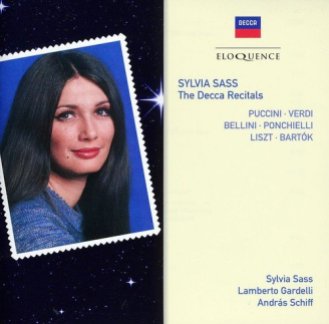Sylvia Sass shot to stardom at the age of 25 after singing the role of Griselda in a 1975 Covent Garden production of Verdi’s I Lombardi which also starred José Carreras. Decca were quick to sign her up and her first recital LP (one side of Puccini, one of Verdi) followed in 1977. A further opera recital followed in 1979 and finally in 1981 a recital of songs by Liszt and Bartók, in which she got to sing in her native Hungarian. She also appeared on Solti’s recordings of Don Giovanni (as Donna Elvira) and Bluebeard’s Castle and on the Philips recording of Stiffelio. She was hailed as the new Callas and, like others saddled with the epithet before her, her international stardom was short-lived, though she continued to sing in opera (though mostly in Hungary) until 1995 and made many records for Hungaraton.
From the very first notes of Turandot’s In questa reggia it is clear that this is a singer with a personality, always aware of the dramatic possibilities of the music. The voice can caress, but equally it has bite and power and the top can glare when singing at full tilt. The four Puccini heroines given here (Turandot, Tosca, Manon and Butterfly) emerge as distintinctively different characters, which isn’t always the case in a Puccini recital. There is also much that is fine in the Verdi items, the Sleepwalking Scene from Macbeth being particularly good, but here we notice a tendency, also evident in the Puccini items, for there to be too great a gap between her loud and soft singing, where the loud singing can take on a strident, squally edge that contrasts too greatly with the almost disembodied purity of her soft singing.
By the time of the second recital this tendency to veer from ultra soft to ultra loud has become more pronounced, even more noticeable when singing live. I remember seeing her as Norma at Covent Garden in 1980 and you could hardly hear her when she was singing quietly. Not that the second recital doesn’t have its attractions. Lady Macbeth continues to be impressive, and there are some lovely moments in the Il Trovatore aria, with its spectacularly floated high D.
The 1981recital of Liszt and Bartók songs, with András Schiff at the piano, is rather impressive. Sass brings vivid personality to and drama to a song like Liszt’s Die Loreley, as well as a beautiful, comforting quality to Kling leise, mein Lied. She also makes musical sense of Bartók’s sometimes angular vocal lines, brilliantly supported by Schiff’s superb playing of the difficult piano accompaniments.
It is a great shame Sass never really fulfilled the promise of her early successes, but these discs serve to remind us why people found her so exciting when she first burst onto the scene and receive a qualified recommendation from me.


In an interview at the end of July 1977, less than two month before her untimely passing on 16 September that year, Callas recalled an occasion when Leonard Bernstein brought Sylvia Sass to meet her in her Paris apartment:
“I asked her what she would sing for me. She replied ‘Tosca’. I said ‘Oh, no, that’s too easy.’ ‘Traviata?’ ‘Yes, that’s better.’ I explained to her that you must look to the dynamics. I hope she was able to gain something from this, but you know I really would like the great ones to come to me.”
Callas’ recollection shows that she had noticed the problem of the great gap between loud and soft singing in Sass’ vocal make-up and felt Sass had to rectify the issue to perfect her technique.
LikeLiked by 1 person
Fortunately, we have have lots of fine recordings by Sass on Decca, Phillips and Hungaroton to enjoy. Remarkable singer, distinctive and surprising, with a broader repertoire than Callas.
LikeLike
True, she sang operetta and Strauss, as well as Hungarian opera (or at least she recorded them), but she was not in the Callas class. I heard her three time live, first as Elisabetta in Don Carlo, then as Norma (Agnes Baltsa’s Adalgisa stole the show), and finally in a concert performance of Turandot, which used the Alfano ending. She had a terrible habit of cupping one hand to her ear while she waved the other one in the air. Furthermore her pianissimi, which sound lovely on disc, were almost inaudible in the theatre, though full voice she had no trouble beinh heard at all. All in all, a frustrating and puzzling singer. You felt she could have been so much better than she was.
LikeLike
I saw her sing Salome in Los Angeles (one scene) and Medea in concert in Boston, both in the 1990s. I wish I had seen her as Norma in her prime because I love the pirate recordings from Budapest and London. She is amazing on disc. And her video of Tabarro is excellent.
LikeLike
I was looking forward to the Norma immensely, but it was a huge disappointment. The physical mannerisms were distracting and the way she veered between full voice and pianissimo quite disorientating. Baltsa walked away with the honours, both vocally and as an actress.
LikeLike
That’s too bad. Her Budapest Norma two years before the London one sounds stronger and more assured on the pirate recording. Her best performance from all that I’ve heard in her concert Fedora from 1983 in Paris. Flawless.
LikeLike
Posted some photos I took of Sass in rehearsal for final scene of Salome on my blog today. Thought you might be interested. Hope all is well.
LikeLike